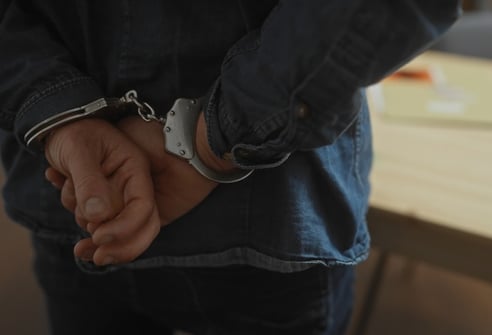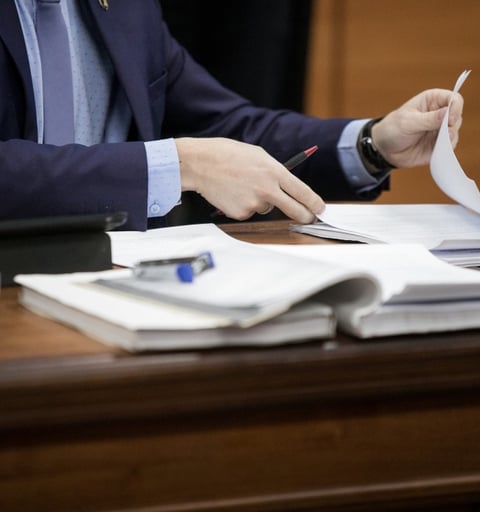
White Collar Criminal Defense Lawyers In Philadelphia
If you need a white collar criminal defense lawyer in the Philadelphia area, Mark D. Hauser provides expert legal representation. Our experienced law firm defends those accused of a variety of white collar crimes, including fraud, tax evasion, money laundering, insider trading, and more. If you’re looking for a reliable criminal defense attorney, contact us today. As an experienced white collar attorney, we provide a range of services by building aggressive defense strategies designed to minimize penalties and protect your valuable reputation. We’re also an experienced theft lawyer in Philadelphia and more.
Types Of White Collar Crimes


White collar crime is mostly non-violent, but it typically involves business dealings and/or money in some capacity. Here are some of the most common white collar crimes that our criminal defense law firm in Philadelphia deals with:
Fraud: This type of white collar crime may include defrauding individuals, entire groups of people, or even the IRS via tax fraud. When someone commits fraud, they typically aim to obtain financial gain through means of deception. The five elements of fraud include providing a false statement as a material fact, knowing that information or statement was incorrect, intending to deceive the victim or victims, the victim relied on the false statements as true, and the victim suffered some form of damage (most often financial) as a result of the fraud or fraudulent activity.
Embezzlement: The crime of embezzlement involves the theft or misappropriation of money or property entrusted to an individual’s care. This white collar crime typically occurs in a business or professional setting and requires an establishment of trust between the defendant and the victim. It might include an executive or employee diverting company funds for personal use by manipulating or falsifying financial records, invoices, etc. Embezzlement may also include someone in charge of managing funds for a charity or non-profit diverting donations or grants for personal gain.
Money Laundering: This white collar crime involves concealing the origins of money via illegal activities to make it look like it came from a legitimate source. The criminal usually integrates the illicit earnings into the company’s financial records without anyone noticing.
Insider trading: This serious white collar crime involves someone selling or buying stocks based on knowledge that is not available to the public. As a result, the inside trader gains an unfair advantage and may obtain financial benefits by trading stocks early based on this “inside knowledge.”
Bribery: The act of offering, giving, receiving, or soliciting any item of value to influence the actions of another is considered bribery. In most cases, someone commits bribery to try and influence a company or individual to act in contradiction with their duty, honesty, and integrity. For example, someone may offer money or gifts in exchange for someone doing them a favor that is either dishonest, illegal, or both.
Tax evasion: This white collar crime occurs when someone or an entire business attempts to avoid paying taxes and other tax-related fees or penalties. It may also refer to someone simply not paying their taxes when due to the IRS and can involve individuals, corporations, trusts, and others.
Penalties For White Collar Crimes


Penalties for white collar crimes vary and depend on a variety of factors, such as the type of crime, the severity of the crime, and more. In general, someone may receive two to four years in prison for extortion or insider training, while large-scale fraud or embezzlement may result in five to 10 years or more in prison. Extensive cases of money laundering can result in over 20 years in prison, while commercial bribery tends to be less, with up to one year in prison, or three years if the bribe is more than $1,000. Your criminal defense attorney in Philadelphia knows the laws and understands how to build a solid defense case to ensure you receive the minimum penalty possible under the law. Civil penalties are also commonly given to those who are convicted of white collar crimes. Those civil penalties also vary based on the jurisdiction, the crime itself, and more. Asset forfeiture is another possible penalty that involves the seizure of someone’s assets (i.e. a home or car) if those assets were obtained as a result of criminal activities. Whether you’re facing charges in Philadelphia or nearby areas, a criminal defense attorney in West Chester, PA, can help you navigate the complexities of white collar crime charges and work to reduce the penalties you may face.
Common Defenses In White Collar Criminal Cases
Every white collar criminal case is different, but our criminal defense law firm may use one or some of the following defenses in your case:
Lack of intent: For this defense, the defendant may have acted unintentionally or without any criminal intent. If someone makes a genuine mistake while doing taxes or bookkeeping, this may serve as a solid defense if it can be proven that the defendant made the mistake without criminal intent.
Insufficient evidence: If there are substantial weaknesses or inconsistencies in the prosecution’s case, the criminal defense of insufficient evidence may be used in court.
Entrapment: If the attorney can prove that the defendant was induced or pressured by law enforcement to commit a crime that would not have otherwise been committed, the entrapment defense could be used.
Statute of limitations: In many jurisdictions, the statute of limitations defense is used if the prosecution delays filing charges past or beyond the set time limit.
Good faith: Sometimes, a defendant has acted in good faith and believed that their actions were perfectly legal.
Lack of knowledge: Some defendants may not be aware that the role they played was contributing to a crime, in which case “lack of knowledge” can be used as a defense.
The Investigation Process In White Collar Crime Cases


Most white collar crime investigations take time and could last weeks, months, or years in some instances. It begins with an investigation based on tips, audits, or reports (discovery). Next, documents are collected from the suspect and from others who may be involved in the crime or have any knowledge of wrongdoings. Examples of documents that are typically collected include bank statements, tax returns, wire transfer receipts, and others. A subpoena is usually required to obtain these documents.
Once the investigation begins and ample documentation is collected, the case may go to a Philadelphia grand jury. The grand jury consists of citizens who investigate whether a crime has been committed, and they can issue subpoenas to receive more documents or to ask someone to give their testimony. If ample evidence is found, the investigation usually leads to an arrest or a notification to the defendant that a crime was potentially committed. Anyone under investigation should seek counsel from a white collar criminal defense attorney immediately.
We Also Defend Corporations Facing Allegations
If you’re a corporation that needs an experienced expungement lawyer in Philadelphia or white collar crime lawyer, contact Mark D. Hauser today. With over 30 years of experience, Mark can handle all forms of white collar crimes for both individuals and corporations facing allegations in the Philadelphia area. Our law firm provides comprehensive legal representation for a wide range of criminal cases, including DUI, drug offenses, assault, white collar crimes, and more.
Don’t let a possible white collar charge prevent you from getting the representation you need. Contact Mark D. Hauser for a consultation at (267) 584-4093 or to learn more about how our law firm can help you today.

